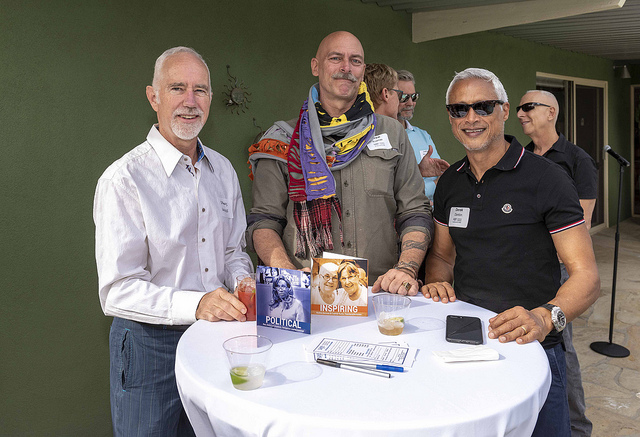by Lisa Gillespie. This story was originally broadcast on 89.3 WFPL.

SAGE supporters and constituents at a recent event in Palm Springs, CA. (Photo courtesy of SAGE / Flickr.)
New preliminary survey research from the University of Kentucky shows that many older LGBTQ adults feel isolated and aren’t tapped into senior services. And that research is shaping programming of a new group geared toward these adults out of Lexington and Louisville.
UK researcher Aaron Guest recently surveyed around 700 LGBTQ adults over age 50 in the state. He asked them about issues related to health care, long-term care and other issues that could impact the lifespan of these adults.
“There may not be many family units to provide care, or friendship networks may have shrunk, so there’s not individuals to step into the caregiver status,” Guest said. “There’s also a fear of going into long-term care because of this idea that when you go into a nursing home or assisted living facility, you have to go back into the closet.”
A little over half of surveyed adults were employed, while about a third were retired and 10 percent were unemployed. Almost 20 percent said they were currently caregivers, and almost 40 percent said they expected to serve as a primary caregiver in the future. Almost 20 percent said they were publicly out in all aspects of their lives, including at work, with family and friends.
Feel Unwelcome at Senior Centers
Guest recently released preliminary findings and plans on issuing a full analysis of survey data in the coming months. But an early analysis showed that 73 percent of people surveyed said they did not attend events at their local senior center. Guest said the final analysis will break down the reasons behind the numbers.
“They don’t attend events and their local senior centers in part because they didn’t feel welcome,” Guest said. “So I think that’s an excellent opportunity for us to improve the inclusiveness of the senior centers and community centers in Kentucky.”
Fairness Campaign Director Chris Hartman agrees. His group is working with other local leaders to start a local chapter of SAGE, a national advocacy and services group for LGBTQ older adults. The chapter will kick off on Jan. 27 with a dinner in Louisville. Hartman said the traditional meeting spaces for LGBTQ people — like bars or clubs — aren’t necessarily places older adults feel a sense of community. And the lack of an alternative can add to a sense of isolation.
“[These] were not places where they were finding the community that they were looking for,” Hartman said.
He said SAGE of the Bluegrass will host at least five events a month in both Louisville and Lexington. There will be support groups, movie nights and social outings.
“One of the chief longevity and health factors for all older adults is that they have a supportive and loving community or support network,” Hartman said.
“So learning what it is that our LGBTQ elders need, where they live, what they’re missing, these are the things that hopefully will help our organizations better find and serve this aging population to keep them healthy and help them live longer.”
Inclusion Training for Health Professionals
Guest said many people surveyed reported facing discrimination when trying to go to the doctor – either with negative attitudes or being turned away outright. Hartman said SAGE will eventually work to do trainings with health care providers – both in doctor’s offices and in long-term care facilities – on inclusion.
“LGBTQ folks largely end up going back into the closet when they go into these assisted living or nursing home facilities,” Hartman said. “And then the rest of the population in the facility is all mostly over 60- or 70-years-old, which, we know acceptance for LGBTQ identities is far greater at the other end of the age spectrum. I understand why folks are fearful.”
A lack of access to these services matters, and even earlier in life can have a detrimental impact on the longevity of LGBTQ adults. Research shows lesbian, gay and bisexual adults are more likely to delay needed care and prescriptions — or not get treatment at all — and these adults are also more likely to receive health care services in the emergency room versus in an office setting. They’re also more likely to have psychological distress, problems with alcohol abuse, to smoke cigarettes and to have higher rates of cancer.
The first SAGE event in Louisville kicked off on Jan. 27 at ElderServe in downtown Louisville.
This article was written by Lisa Gillespie is WFPL’s Health and Innovation Reporter. with the support of a journalism fellowship from the Gerontological Society of America, Journalists Network on Generations and AARP.
